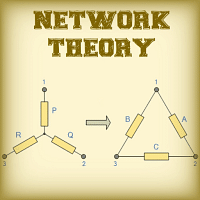Electronics and Communication Engineering (ECE) Exam > Electronics and Communication Engineering (ECE) Questions > Needed a Document for topic wise previous yea...
Start Learning for Free
Needed a Document for topic wise previous year questionfor example in digital section all previous year digital question...if chapter wise then it will be like done pe suhaga?
Related: Digital Electronics
Most Upvoted Answer
Needed a Document for topic wise previous year questionfor example in ...
Digital Electronics
Digital Electronics is a branch of electronics that deals with the study of digital signals, logic gates, and digital circuits. It involves the design, analysis, and implementation of various digital systems and components.
Importance of Digital Electronics
Digital Electronics has become an integral part of our daily lives. It is used in various applications such as computers, smartphones, televisions, and many more. The digital circuits and systems are designed to process and manipulate digital signals in the form of 0s and 1s. It provides a more reliable, efficient, and accurate way of processing information compared to analog systems.
Previous Year Questions on Digital Electronics
Here are some previous year questions on Digital Electronics:
1. Explain the working principle of a D flip-flop.
2. What is the difference between combinational and sequential circuits?
3. Design a 4-bit binary counter using D flip-flops.
4. Compare and contrast synchronous and asynchronous counters.
5. What is the purpose of a multiplexer in digital systems?
6. Differentiate between a decoder and a demultiplexer.
7. Discuss the concept of Boolean algebra and its applications in digital electronics.
8. Explain the working of a 4-bit magnitude comparator.
9. Design a logic circuit for a 3-to-8 decoder.
10. What is the significance of Karnaugh maps in simplifying Boolean expressions?
Preparing for Digital Electronics Questions
To prepare for digital electronics questions, it is important to understand the basic concepts of digital circuits and logic gates. Here are some tips to help you prepare:
1. Study the fundamentals: Start by understanding the basic concepts of digital electronics, including logic gates, Boolean algebra, flip-flops, counters, and multiplexers.
2. Practice previous year questions: Solve previous year question papers to get familiar with the types of questions asked and the exam pattern. This will help you identify your strengths and weaknesses.
3. Understand the working principles: Focus on understanding the working principles of various digital components and circuits. This will help you analyze and design digital systems effectively.
4. Use study materials: Refer to textbooks, lecture notes, and online resources to enhance your understanding of digital electronics. Make sure to use reliable and credible sources such as EduRev for study materials.
5. Take mock tests: Practice solving mock tests to improve your time management and problem-solving skills. This will also help you assess your preparation level and identify areas that need more attention.
Remember, consistent practice and a thorough understanding of the concepts are key to mastering digital electronics. Good luck with your preparation!
Attention Electronics and Communication Engineering (ECE) Students!
To make sure you are not studying endlessly, EduRev has designed Electronics and Communication Engineering (ECE) study material, with Structured Courses, Videos, & Test Series. Plus get personalized analysis, doubt solving and improvement plans to achieve a great score in Electronics and Communication Engineering (ECE).

|
Explore Courses for Electronics and Communication Engineering (ECE) exam
|

|
Needed a Document for topic wise previous year questionfor example in digital section all previous year digital question...if chapter wise then it will be like done pe suhaga? Related: Digital Electronics?
Question Description
Needed a Document for topic wise previous year questionfor example in digital section all previous year digital question...if chapter wise then it will be like done pe suhaga? Related: Digital Electronics? for Electronics and Communication Engineering (ECE) 2024 is part of Electronics and Communication Engineering (ECE) preparation. The Question and answers have been prepared according to the Electronics and Communication Engineering (ECE) exam syllabus. Information about Needed a Document for topic wise previous year questionfor example in digital section all previous year digital question...if chapter wise then it will be like done pe suhaga? Related: Digital Electronics? covers all topics & solutions for Electronics and Communication Engineering (ECE) 2024 Exam. Find important definitions, questions, meanings, examples, exercises and tests below for Needed a Document for topic wise previous year questionfor example in digital section all previous year digital question...if chapter wise then it will be like done pe suhaga? Related: Digital Electronics?.
Needed a Document for topic wise previous year questionfor example in digital section all previous year digital question...if chapter wise then it will be like done pe suhaga? Related: Digital Electronics? for Electronics and Communication Engineering (ECE) 2024 is part of Electronics and Communication Engineering (ECE) preparation. The Question and answers have been prepared according to the Electronics and Communication Engineering (ECE) exam syllabus. Information about Needed a Document for topic wise previous year questionfor example in digital section all previous year digital question...if chapter wise then it will be like done pe suhaga? Related: Digital Electronics? covers all topics & solutions for Electronics and Communication Engineering (ECE) 2024 Exam. Find important definitions, questions, meanings, examples, exercises and tests below for Needed a Document for topic wise previous year questionfor example in digital section all previous year digital question...if chapter wise then it will be like done pe suhaga? Related: Digital Electronics?.
Solutions for Needed a Document for topic wise previous year questionfor example in digital section all previous year digital question...if chapter wise then it will be like done pe suhaga? Related: Digital Electronics? in English & in Hindi are available as part of our courses for Electronics and Communication Engineering (ECE).
Download more important topics, notes, lectures and mock test series for Electronics and Communication Engineering (ECE) Exam by signing up for free.
Here you can find the meaning of Needed a Document for topic wise previous year questionfor example in digital section all previous year digital question...if chapter wise then it will be like done pe suhaga? Related: Digital Electronics? defined & explained in the simplest way possible. Besides giving the explanation of
Needed a Document for topic wise previous year questionfor example in digital section all previous year digital question...if chapter wise then it will be like done pe suhaga? Related: Digital Electronics?, a detailed solution for Needed a Document for topic wise previous year questionfor example in digital section all previous year digital question...if chapter wise then it will be like done pe suhaga? Related: Digital Electronics? has been provided alongside types of Needed a Document for topic wise previous year questionfor example in digital section all previous year digital question...if chapter wise then it will be like done pe suhaga? Related: Digital Electronics? theory, EduRev gives you an
ample number of questions to practice Needed a Document for topic wise previous year questionfor example in digital section all previous year digital question...if chapter wise then it will be like done pe suhaga? Related: Digital Electronics? tests, examples and also practice Electronics and Communication Engineering (ECE) tests.

|
Explore Courses for Electronics and Communication Engineering (ECE) exam
|

|
Suggested Free Tests
Signup for Free!
Signup to see your scores go up within 7 days! Learn & Practice with 1000+ FREE Notes, Videos & Tests.























